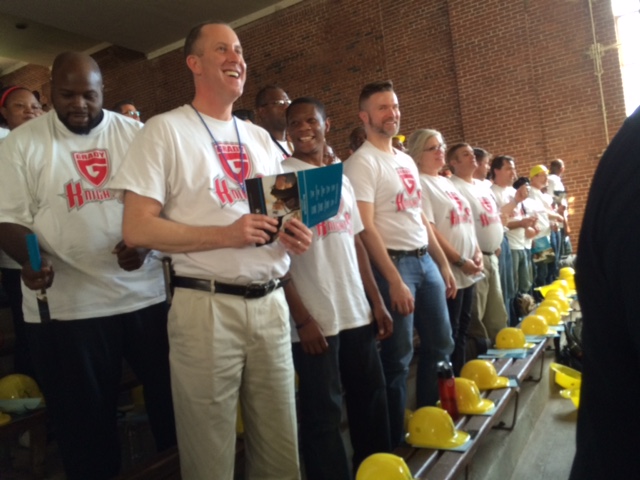Standing in front of a pile of rubble representing the failings and rebirth of Atlanta Public Schools, Superintendent Meria Carstarphen today outlined the challenges facing the district.
Carstarphen explained the five crucial foundational changes she said the district will need to make to provide students with “choice-filled lives”: quality instruction, intensive academic support for at-risk students, investment in leaders, retention of high quality educators, and wrap around services or improvements to get students “ready and engaged.”
“I want every student to have sense of pride when they said ‘I graduated APS,’” Carstarphen said at her State of the District address at the former David T. Howard High School building to a crowd of Grady Cluster educators and Howard alumni.
The stakes for Carstarphen’s planned transformation are high because of the looming Opportunity Schools District. If Georgia citizens vote OSD into law next year, 29 chronically-low performing APS schools would be eligible for state take over. The superintendent said APS will focus intensive efforts on the Douglass and Carver clusters which have some of the lowest-performing elementary schools in the state.
Carstarphen said many schools within APS are failing because they lack a robust educational foundation. Furthermore, Carstarphen said the transformational change necessary to provide each cluster and school with the proper foundation will likely be more difficult than incremental change.
“I know it’s going to be hard on people and on the school community,” Carstarphen said.
While Carstarphen said her transformational plan will focus money and resources primarily on low-performing schools, every school will receive some money or infrastructure upgrade.
“I want every school to get something,” Carstarphen said.
Carstarphen said her new methodology for creating change within APS relied on focusing on children instead of the arguments and conflicts between adults in the district.
“We have to move from adult-centered agendas to a child-centered behavior. When we don’t do that, they don’t get a quality education, which means they don’t have quality choices, which means we leave them with no hope,” Carstarphen said.
At the culmination of her speech, Carstarphen asked educators to envision what a transformed APS would look like.
“What would it take to make APS worthy of the next Martin Luther king? … It starts with you and your own motivating compelling vision,” Carstarphen said. “Welcome to the next phase of our transformation.”










